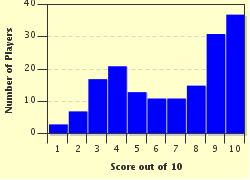Quiz Answer Key and Fun Facts
1. From which Roman name does the word 'Portugal' derive?
2. The Celts invaded Portugal in the first millennium BC.
3. The Romans also invaded Portugal and in the south of the country they found friendly natives. However, that did not happen in the north, where a rebellion started. The Lusitanians and other native tribes were involved in this rebellion. Who was their leader?
4. There was one event in the Portuguese History that can be called as the seminal event for the foundation of Portugal. It happened in June 24, 1128. What was it?
5. The independence of Portugal was recognized in the Treaty of Zamora, where D. Afonso Henriques had the assistance of a representative of the Holy See. In what century did these events take place?
6. Today's capital city of Portugal is Lisboa (or Lisbon). However, the country's first capital city was in the north and it is known to this day as "the city where Portugal was born". Which city is this?
7. One African city marks the beginning of the Discoveries. It was conquered by the Portuguese in 1415 and it was a rich Islamic trade centre. Which city was this?
8. In 1487, one navigator achieved a great accomplishment: he managed to turn the Cape of Storms which, from that point on became known by another name.
Who was this navigator?
9. From 1580 to 1640, Portugal was under Spanish rule. However, due to the general insatisfaction, there was a war to restore the Portuguese independence. This was called the Restoration War and finally Portugal became an independent nation again. When?
10. In the 20th century, a form of government took over under the leadership of António Oliveira Salazar. He was the chief of state from 1926 to 1970 (date of his death). This government was overthrown by the Revolução dos Cravos of 1974. What was this form of government (legally introduced in 1933) better known as?
Source: Author
carla7
This quiz was reviewed by FunTrivia editor
bloomsby before going online.
Any errors found in FunTrivia content are routinely corrected through our feedback system.


